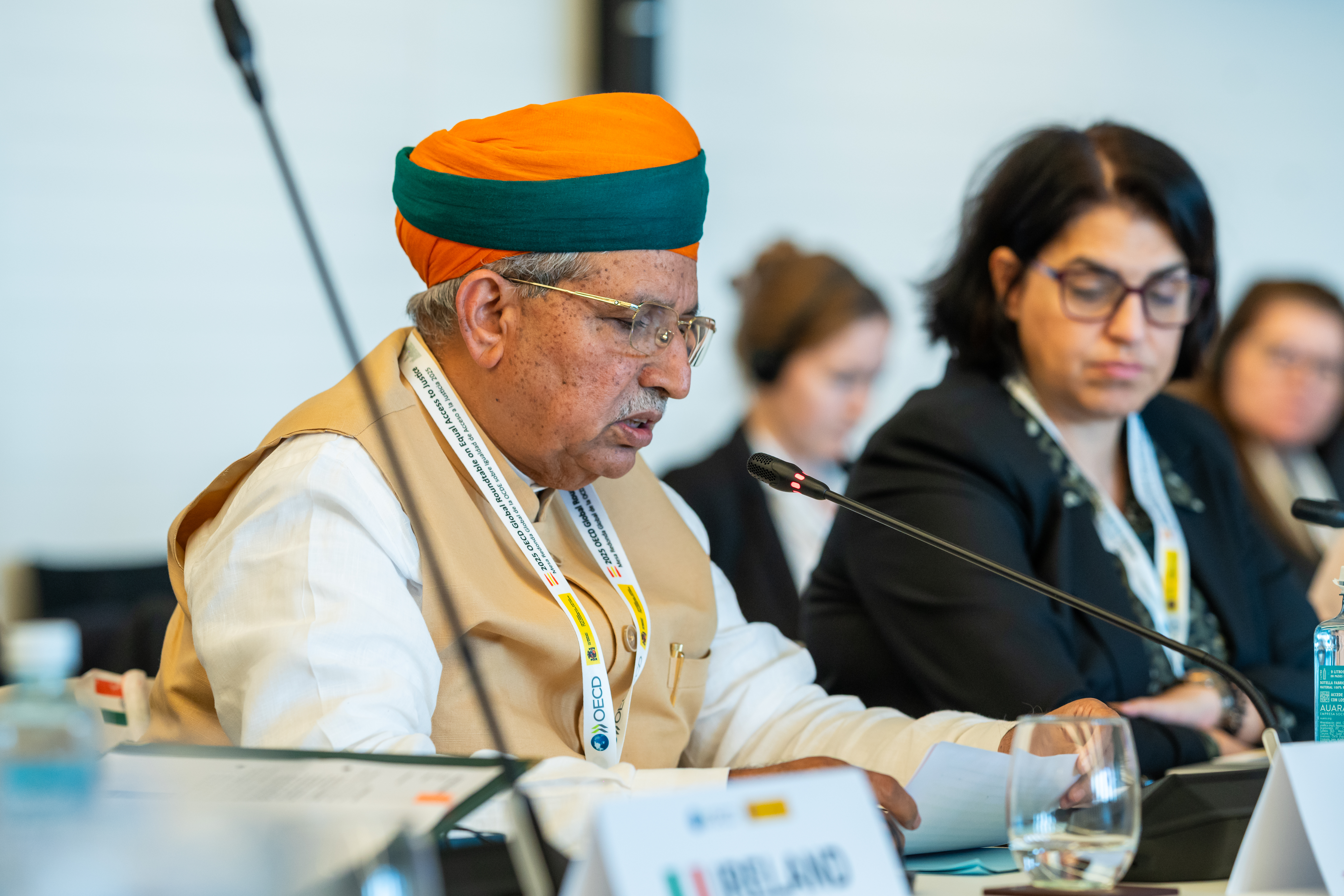Ministry of Law and Justice
India emphasises commitment to data-driven, people-centred justice reforms at OECD Global Roundtable in Madrid
Hon’ble Union Minister of State (Independent Charge) for Law & Justice, Shri Arjun Ram Meghwal, highlights India’s model of technology-enabled, citizen-facing justice delivery
Posted On:
14 NOV 2025 2:43PM by PIB Delhi
The Hon’ble Minister of State (Independent Charge) for Law & Justice, Shri Arjun Ram Meghwal participated in the 10th OECD Global Roundtable on Equal Access to Justice, held in Madrid, Kingdom of Spain, at the Justice Leaders Dialogue on the theme “Data-Driven and Resilient Justice Systems for Shared Prosperity.”
The Roundtable brought together Ministers of Justice, senior judicial administrators, global leaders, policymakers and experts to deliberate upon ways in which justice institutions can remain responsive and trusted in an era of rapid technological change, economic uncertainty, and evolving citizen expectations.
In his address, the Hon’ble Minister underlined India’s enduring commitment to building a people-centric, technology-enabled and inclusive justice ecosystem. He noted that India’s constitutional vision of justice—social, economic and political—continues to guide every reform, anchored in Article 39A of the Constitution which enshrines equal justice and free legal aid for all.

Quoting Dr. B.R. Ambedkar, the chief architect of the Indian Constitution, Shri Meghwal said: “Justice has always evoked ideas of equality, of proportion, of compensation. Equity signifies equality. Rules and regulations, right and righteousness are concerned with equality in value. In short, justice is simply another name for liberty, equality, and fraternity.”
He highlighted that India’s justice reforms are guided by the vision that justice must be not only accessible but also empathetic and responsive to the needs of every citizen. He emphasised that, in a large and diverse democracy, courts cannot be reformed in isolation; data, digital public infrastructure, and human-centred outreach must advance together.
Shri Meghwal further elaborated on India’s landmark e-Courts Mission Mode Project, one of the largest digital transformations in the justice sector worldwide. Currently in its third phase (2023–2027), the project aims to establish intelligent, paperless, and integrated courts through the use of advanced technologies such as Artificial Intelligence (AI), Machine Learning (ML) and Natural Language Processing (NLP). Over 560 crore pages of judicial records are being digitised to make courts faster, transparent, and future-ready. Over 3.86 crore hearings have already been conducted virtually, saving significant time and cost for litigants and undertrials.
During the COVID-19 pandemic alone, courts across India held nearly 43 million virtual hearings, demonstrating the judiciary’s commitment to inclusivity and access to justice amid the public health crisis. Live streaming of proceedings in the Supreme Court and several High Courts, supported by AI and NLP tools, has further democratised the judicial ecosystem and enhanced transparency. Courts are being securely hosted on cloud platforms to ensure reliability and continuity. Through the Inter-Operable Criminal Justice System (ICJS), courts are being digitally linked with police, prosecution, prisons, and forensics, enabling quicker, evidence-backed decision-making. He added that India has also taken innovative steps such as the Legal Information Management and Briefing System (LIMBS) for increasing judicial efficiency and effectiveness, streamlining government litigation.
The Hon’ble Minister also highlighted India’s flagship programme DISHA (Designing Innovative Solutions for Holistic Access to Justice), which integrates digital innovation with community-based outreach to ensure that justice services reach the last mile. He noted that under the Tele-Law initiative, over 1.1 crore citizens have received free legal advice in 22 Indian languages, reaffirming India’s resolve to bridge barriers of geography, language, and awareness through technology. Initiatives such as Tele-Law, Nyaya Setu, and Vidhi Baithaks have collectively empowered millions of citizens, bridging barriers of geography, language, and awareness.
On the role of emerging technologies, the Minister emphasised that India’s adoption of AI in the justice system remains human-supervised, ethically guided, and privacy-conscious. Tools such as SUVAS (Supreme Court Vidhik Anuvaad Software) for translation of judgments into regional languages, SUPACE (Supreme Court Portal Assistance in Court Efficiency) for intelligent case research, and AI-assisted filing and case-management systems are enabling greater accuracy, speed, and accessibility while upholding judicial discretion and fairness.
He recalled that India hosted the “1st Regional Conference on Access to Legal Aid: Strengthening Access to Justice in the Global South” in November 2023, which brought together 191 participants from 51 countries to deliberate on innovative models of legal aid delivery and judicial efficiency. The Hon’ble Minister reiterated India’s readiness to collaborate with OECD and partner countries to advance frameworks on ethical AI governance, data interoperability, and digital inclusion, ensuring that technological progress strengthens, rather than divides, access to justice.
India’s delegation also included Law Secretary Dr. Anju Rathi Rana. The participation of India at the OECD Roundtable reaffirmed the country’s commitment to people-centred, data-backed, and innovation-driven justice delivery, and to working with global partners to build resilient justice systems for shared prosperity.
Guided by the timeless Indian philosophy of Vasudhaiva Kutumbakam — “The World is One Family” — Shri Meghwal called upon all nations to build bridges of cooperation, trust, and mutual understanding for equal access to justice across the world.


0GBY.jpg)
***
Samrat
(Release ID: 2189986)
Visitor Counter : 1134